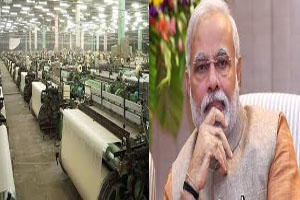
Textile industry demands reform from Centre
YarnsandFibers News Bureau 2015-09-10 11:00:00 – New DelhiAt a time when dumping of Chinese textile products like fabric and garment have been hurting the Indian textile industry with lack of free trade agreements (FTA) and reduction in duty free scripts benefits for textile exporters, a meeting was held on 8th Sept between the Prime Minister, Narendra Modi and top business heads of the textile industry to discussion over the issues faced by them and are expecting the central government to take quick action.
The textile and clothing industry’s yearly turnover is pegged at $105 billion, of which exports form 35-40 percent. Capacity utilisation, especially in yarn, has declined by 15-20 percent in the past couple of months due to decline in export competitiveness. K Selvaraju, secretary general of the Southern India Mills Association hopes measures on FTAs, on export incentives and release of funds under the Technology Upgradation Fund Scheme (Tufs), among others will be taken. So far, investments worth Rs 1 lakh crore have not received any subsidy benefits under Tufs.
While O P Lohai, chairman of Indo Rama Synthetics said that the recent rupee depreciation has helped textile exporters in some ways but the industry continues to get hurt in many other ways. For instance, as against the rupee, India's export target nations have also seen currency depreciation, which has almost nullified any benefit. Also, not only is the excise duty on synthetic textile products of 12.5 per cent hurting the industry, the reduction in duty-free scripts from two to four per cent to zero to two per cent has reduced export competitiveness.
Sanjay Lalbhai, managing director of textile conglomerate Arvind Ltd, pointed out that China has a lot of surplus capacity which is dumped into countries like India through other routes. India has signed an FTA with Bangladesh, which allows any garment converted in Bangladesh, whether the fabric is from that country, India or any other country like China, to arrive duty-free in India. Such agreements are hurting India, where even Chinese products can now come duty-free. India was competent enough in yarn exports. However, China has stopped buying yarn from India and instead begun producing.
Lalbhai says that while competing nations such as Sri Lanka, Pakistan and Bangladesh have signed FTAs, for instance with Europe, we have got left out. According to him, India has to become part of FTAs. India is not part of any major FTA, unlike its competing nations. If agreements like the Trans-Pacific Partnership agreement come through, India could get completely marginalized.
Selvaraju said that unlike India’s competing nations like Vietnam, Bangladesh and Cambodia which have duty-free access, all textile products from India attract four to 15 per cent duties. There is a demand for an export incentive of three per cent for yarn, five per cent for fabric and seven per cent for garments.
The situation has aggravated in the past couple of months, with imports growing, especially from China. In such a scenario, the Centre needs to provide a level playing field.
Market Intelligence
Ask for free sample Report

experience
Customer Base
dedicated team
Countries Served Worldwide









